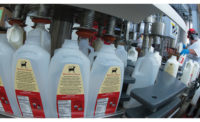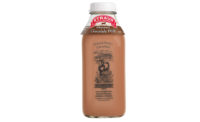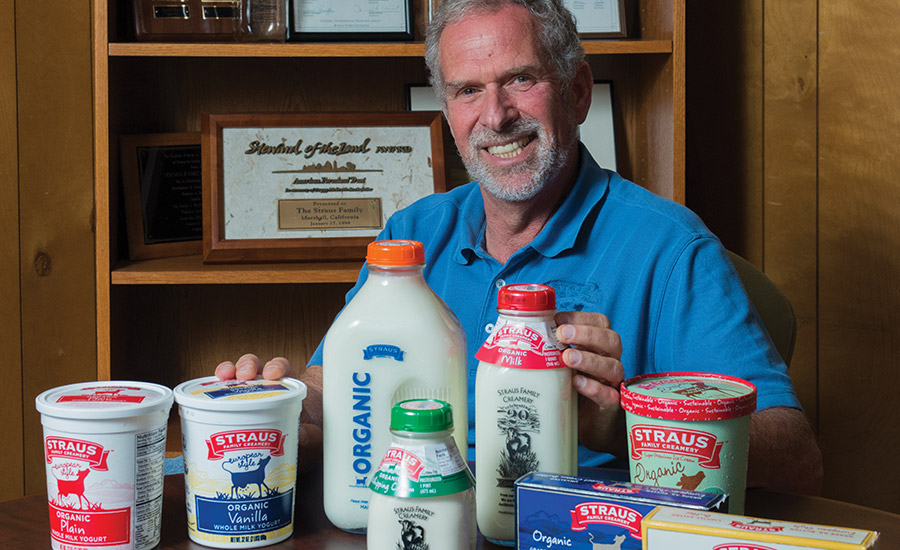Straus Family Creamery proves itself a model citizen

Albert Straus, founder and CEO of Straus Family Creamery, said a key focus of the creamery is to help family dairy farms in California’s Marin and Sonoma counties thrive.

In 2018, Straus Family Creamery will celebrate the 10th anniversary of its Barista milk. The product line, available for the specialty and wholesale channels, has grown every year since its launch.

Promising 38% less total sugars than other organic chocolate milk brands in the market today, Straus organic chocolate milk was launched in August 2017.

Organic whole milk and 2% reduced-fat milk are among Straus Family Creamery’s flagship products.

Straus Family Creamery introduced two new organic Greek yogurts — whole milk vanilla and lowfat plain — in March 2017.

Robert McGee, president of Straus Family Creamery, said the incorporation of glass bottles strengthens the company’s sustainability efforts.






Straus Family Creamery has a calling that goes well beyond being a successful manufacturer of organic dairy products. The Marshall, Calif.-based operator wants family dairy farms in northern California’s Marin and Sonoma counties to thrive, and that is a key focus of its operating strategies.
Just as important is Straus Family Creamery’s dedication to sustainability and its strong emphasis on water and energy savings, recycling and landfill waste elimination.
“We are creating a model farming system that can be replicated throughout the country and the world,” said Albert Straus, founder and CEO. “We also look at everything through a sustainability lens and are working on programs to reduce our impact to the environment.”
Read more about the Straus Family Creamery processing facility
The roots for Straus Family Creamery were planted in 1941 when Albert’s father, Bill Straus, opened the Straus Dairy Farm, with 23 cows in the Northern California coastal town of Marshall. Albert Straus joined the operation in 1977 after graduating from college with a degree in dairy science.
The prospect of operating an organic creamery began in 1990 when a potential dairy farm customer inquired about the availability of organic milk for ice cream. In 1994, after studying organic production techniques, creating a business plan and obtaining financing, the younger Straus launched what he said was the first certified organic dairy and creamery west of the Mississippi River.
Since then, the business has steadily grown. While the Straus Dairy Farm was initially the only provider to the creamery, it now accounts for just 10% of the milk supply. Eight other area dairy farms also distribute certified organic milk to the operation, the company noted.
All in the family
Maintaining a close relationship with the family farms is a crucial operating element, so Straus Family Creamery meets with the farmers every quarter to discuss volumes and prices.
Straus said the area farms supported Straus Family Creamery financially and emotionally during the economic downturns in 2007 and 2008, and the creamery is currently working to maintain the price it pays to the organic milk suppliers despite an excess of organic milk.
“Our competitors have been reducing their organic contracts 25% to 50% or more while we reduced our pay price by just 2%,” he stated. “It is very difficult for small family farms to survive.
“We’re trying to create a farming system that is sustainable economically, as local, healthy farming communities are essential to society,” Straus added. “It is ingrained not only in myself, but in our company.”
Operating an entirely organic, non-GMO Project Verified and kosher creamery that produces such items as milk, cream, ice cream, European-style and Greek yogurt, butter and sour cream, meanwhile, creates diverse operating challenges.
Because there are fewer vendors that meet its stringent ingredient requirements, Straus Family Creamery typically must pay more for its supplies than conventional processors do, and there is greater pressure to ensure there will be a consistent availability of ingredients, said Robert McGee, the company’s president.
“We have to manage our expenses as efficiently as possible as the cost of doing business is higher,” he stated. “That includes figuring out how to minimize waste.”
Waste-reducing measures includes straining whey liquid during the production of Greek yogurt and converting it to feed ration for cows at the Straus Dairy Farm, along with using excess buttermilk from butter production in yogurts and ice cream. In addition, the creamery uses the approximately 6,000 gallons of cow-water it removes daily from its milk condensing for equipment washing. The equipment-cleaning solutions used at the creamery are potassium based instead of sodium based.
The creamery processes about 16,000 gallons of milk each day, but because products are made to order on a weekly basis, volumes vary depending on the time of year.
Straus’ overall output, however, is less than that of many other processors. Straus noted, for instance, that the company develops butter in 500-pound batches and, as a smaller, manual operator, creates as much in a day as larger companies with a continuous churn produce in an hour.
“We like to call our butter ‘artisan,’” he said. “It is a process I developed and reflects the quality of the butter, which is 85% fat and very low moisture so it doesn’t burn easily when sautéed.”
Because Straus Family Creamery categorizes all of its products as premium, the selections also are more expensive than those of most of its competitors, Straus admitted.
“We feel the quality is superior and is something we don’t want to undervalue,” he said.
In step with the times
The company, meanwhile, is consistently expanding its product lines. After first producing quarts of whole and non-fat milk and butter in 1994, Straus Family Creamery added butter cubes, half-gallon glass bottles of milk and a full yogurt line. Ice cream, Barista milk, Greek yogurt and sour cream were launched in the 2000s, along with additional sizes and flavors for many of the lines.
“The original goal was to be diversified enough so if one product line wasn’t very successful or lost sales, we would have another to maintain our economic viability and keep a level playing field for our farms,” Straus said.
Rollouts in 2017 include chocolate milk with 4% milk fat and free trade organic cocoa, as well as the reformulation of two ice cream flavors.
“We are routinely bringing out new selections in accordance with what is selling well, what can use updating and in response to ascending market trends,” McGee said.
Among the creamery’s recent adjustments is increased use of milk from Jersey cows — which have a greater fat content — instead of Holsteins. The move is in response to rising demand for products with higher milk fat, Straus said.
The majority of the creamery’s retail customers are outlets that emphasize natural and organic products, including Whole Foods, but selections also are available at conventional chains such as Safeway, Sprouts and Raley’s, as well as local independent stores. Retail outlets generate about two-thirds of Straus Family Creamery’s revenues, Straus noted, while specialty and wholesale businesses, including restaurants, coffee shops, universities, secondary schools, ice cream shops and bakeries, also are active markets.
The company’s corporate office and warehouse in Petaluma are about 40 miles north of San Francisco and approximately 23 miles from the Marshall plant. Straus Family Creamery uses local, regional and national distributors to transport products from its warehouse to retail and wholesale customers.
Approximately 65% of its business is in California, with most of the remaining revenues coming from sales in Oregon, Washington, Arizona, New Mexico, Colorado, Utah, Nevada, Idaho and Texas.
In addition to using brokers to sign retailers, Straus Family Creamery relies on an in-house team for specialty and wholesale sales, along with a director of retail sales and four merchandisers in Northern and Southern California.
“That enables us to get into stores and interact directly with our customers and their consumers and to make sure the shelves are well-stocked with a good presentation,” McGee said. “The whole idea is to develop and strengthen relationships and help people understand how our products are a bit different from others.”
An emphasis on the environment
Because of its major aims of creating a regional sustainable farming model and offering fresh, high-quality products, Straus Family Creamery limits its geographic reach, Straus stated. The further it expands from its core markets, the greater the challenge and cost in getting consumers to understand the company and its products.
“We were in Chicago a decade ago, and it was very expensive and hard to keep our products on the shelf because people didn’t know us,” Straus noted.
Shipping products thousands of miles to the Midwest and East Coast also burns more diesel fuel and increases wear and tear on trucks and the roads, McGee said, which goes against the company’s sustainability objectives. It also negatively impacts family farms elsewhere in the country.
“We want to see healthy, robust rural and farming communities across the U.S.,” he stated. “Sending our products everywhere works against the local organic dairy farmers in Michigan, the Northeast and other parts of the country.”
While the emphasis on sustainability is a strong competitive differentiator, publicizing the creamery’s environmental focus is also part of a larger mission to demonstrate how companies can appropriately manage natural resources, McGee said.
Straus Family Creamery has a sustainability department, a director of sustainability and a sustainability coordinator; trucks 94% of the wastewater from the creamery to Straus Dairy Farm to be reused in methane digestion and then for irrigation of the pastures; and uses an electric feed truck — powered by cow waste — to feed the herd at the Straus Dairy Farm. The digester collects manure and converts the energy stored in the organic matter into methane.
“The goal is to create awareness and understanding so that the public will become more educated and hopefully involved in looking for solutions for air and water pollution, soil depletion and carbon and greenhouse gas emissions,” McGee said. “Consumers hopefully will support the businesses that are trying to ensure that there is a healthy world for generations to come.”
Staying in the spotlight
Straus Family Creamery promotes its products and methods with traditional advertising and public relations; through such social media sites as Facebook, Twitter and Instagram; and by having executives speak at industry conferences, Straus said.
Another major attention-getter is its use of glass milk bottles in pint, quart and half-gallon sizes. The creamery charges distributors a $2.00 deposit on each bottle, with the fee passed along to retailers and then to consumers during each transaction.
“Milk in glass bottles is not the easiest thing to put on the market, and most large companies don’t have the facilities or patience to produce such items well,” Straus said.
Creating such a system is challenging, he added, because there also must be a program in place for retailers to take deposits and bottle returns from consumers, as well as for distributors to pick up the bottles when they deliver the next order.
But the incorporation of glass bottles strengthens the company’s sustainability efforts. The creamery typically reuses each bottle four to six times, resulting in less waste and lower recycling expenses, McGee stated.
“Individual consumers may not feel the savings directly, but there is a positive impact to society,” he said. “We’re helping to cover costs that the public might not realize are there.”
Merchandising products with clean labels and without the thickeners, gums and gels that many competitors use to add richness to dairy products is also intended to set the creamery apart, McGee stated.
Looking ahead, Straus Family Creamery is planning to construct a new processing facility; the facility will replace its current creamery and increase plant space to about 40,000 square feet from the current 16,000. It also will better enable the company to achieve its additional goals of moving into new product categories, expanding existing lines and adding equipment to increase production capacity and package sizes, McGee said.
The company is reviewing possible sites in the Petaluma area for the plant, which is likely to open in 2019 or 2020.
“It is an investment in the future of the company and for the ability to grow and fulfill our mission,” McGee said. “The plant will allow us to continue our accomplishments with family farming, organic integrity, revitalizing rural communities and creating great-tasting healthful products.”
Possible product additions include more sizes and types of yogurt, including drinkable selections; lower fat or cultured cheeses; and a greater variety of ice cream, Straus noted.
“Over the next five years, we would like to add perhaps three to four new categories,” McGee added. “We also are looking at adding packaging lines that would allow us to be much more efficient and feel confident about growing the business at a price that is right for the farmers, the Straus family and the customers.”
He noted that the company still is seeking additional ways to operate the business more sustainably and to further reduce water and energy use, food waste and the use of packaging materials.
“We follow very specific practices to make sure the impact on the land and air is as minimal as it could possibly be,” McGee said.
To help ensure the local family farms also remain vibrant, Straus said the company intends to work with area high schools and junior colleges in offering programs that can enhance students’ agricultural and technical skills and enable them to forge an agricultural or processing-related career path.
“We want to collaborate and form a common vision for rural farms and rural communities,” he stated. “It is to protect and advance the agricultural community because that has been going in the other direction for years.”
Looking for a reprint of this article?
From high-res PDFs to custom plaques, order your copy today!














